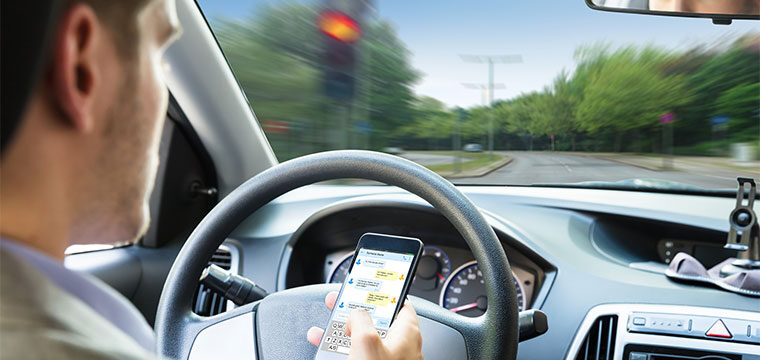There are three things you check for when leaving home: your phone, your wallet and your keys. Your phone is a great communication tool. There are few times we are not plugged in and available so long as we have our phone in our pocket, our purse or next to us in the car. But, Missouri law requires us to drive our car as a very careful person would under similar circumstances. In other words, we must remain focused on the primary task of driving when behind the wheel – despite the temptations of distracted driving.
Consider whether that latest notification you received is worth causing a crash. According to The National Highway Traffic Safety Administration (NHTSA), distracted driving crashes killed 3,142 Americans in a recent year, an average of 9 deaths per day. Additionally, many instances of distracted driving go unreported – creating a larger margin of risk. Here’s what you should know before you pick up your phone while behind the wheel and on the road.
What is Distracted Driving?
Distracted driving is any action that diverts your attention while driving. There are a number of situations that endanger you, your passengers and others on the road. The CDC classifies the three main types of driving distractions as:
- Visual – taking your eyes off the road;
- Manual – taking your hands off the steering wheel; and
- Cognitive – taking your focus or concentration off driving.
Whether you are talking to your kids, grabbing an item from the backseat or even grabbing a quick bite, those 5-second moments immediately increase the likelihood of a life-altering car crash due to distracted driving.
Who is Most at Risk?
Cell phone usage and other distractions affect all drivers on the road. And, these disturbances only increase for young or inexperienced drivers between the ages of 15-19 years.
In the United States, teen and young adult drivers account for 25% of all distracted drivers involved in fatal crashes. While many of these instances directly result from cell phone use, peer passengers – passengers who are of the same age as a driver – are also a dangerous distraction. All passengers have a responsibility to be respectful of inexperienced drivers by keeping music down, keeping their phones to themselves and being attentive.
However, driving experience and age does not magically make drivers more capable of operating a vehicle while distracted. Approximately 70% of all drivers using cell phones in Missouri traffic crashes are 22 years of age or older. While young drivers are at an increased risk – distracted driving is impactful at any age and stage of life.
Are There Any Laws Against Distracted Driving?
Driving distracted is a serious offense – resulting in numerous injury cases, lost time at work, crippling financial debts, lost driving privileges, personal injury or death of the distracted driver, a loved one or other drivers. Throughout the country, many states have laws against hand-held cell phone use, texting while driving and using a phone at any time behind the wheel.
Missouri is currently one of only two states without a cell phone messaging ban for all drivers. However, several lawmakers have introduced distracted driving legislation during the 2022 Missouri legislative session. Prohibiting hand-held wireless communication, operating motor vehicles while using electronic devices and increased penalties for distracted driving are just a few of the bills under consideration in the Missouri General Assembly aimed at reducing distracted driving related crashes.
Keep your Eyes on the Road
The costs of driving distracted outweigh the satisfaction of reading a 5-second text message. Drive safely by keeping your hands on the wheel and your eyes on the road ahead. If you were a victim of a distracted driving crash that was not your fault, our personal injury attorneys can help you build your case. We are fully prepared to fight for the justice you deserve.









